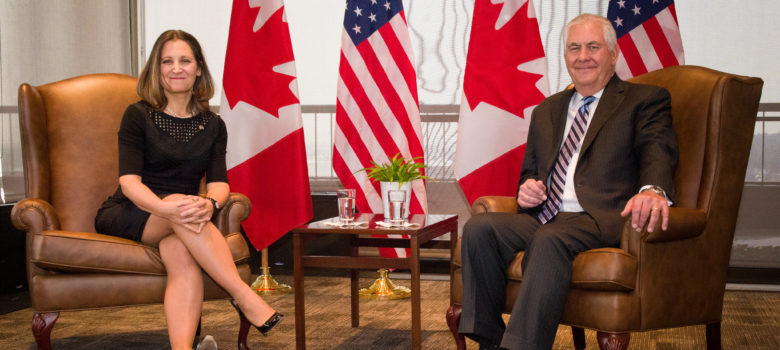The Canadian government has frequently touted its commitment to transparency and consultation with respect to its trade negotiations, citing a steady stream of open events and its receptiveness to public feedback. Indeed, since the renegotiation of NAFTA was placed back on the table, officials say they have talked to nearly 1,000 stakeholders and received more than 44,000 public submissions.
While the openness to public comment represents a notable shift in approach, my Globe and Mail op-ed reports that the government has been far less forthcoming about the creation of secret NAFTA industry advisory groups. According to documents obtained under the Access to Information Act, as of last October, members of those groups had signed 116 confidentiality and non-disclosure agreements that pave the way for access to secret information about the status of the negotiations. Those stakeholders are in addition to the dozen NAFTA Advisory Council members, most of whom have also signed the non-disclosure documents.
The industry advisory groups cover some of the negotiations’ most contentious areas, including agriculture, intellectual property, services, auto, culture, and energy. There are also groups for newer trade issues such as women’s rights, labour, and Indigenous concerns. In all, the government supports at least 12 previously undisclosed advisory groups.
The size of each advisory group varies. The government documents indicate there are at least 14 members in the services group, 12 members in the auto group, and seven in the intellectual property group. The composition of the advisory groups remains a secret, though officials acknowledge that they consist primarily of businesses and their industry associations with few independent voices and no academic experts.
Officials maintain the NDAs are needed to allow for disclosure of the state of the talks and the negotiating positions of the U.S. and Mexico delegations. While revealing Canadian positions would not be subject to confidentiality restrictions, an agreement between the three countries allows for private disclosure of the dynamics of the negotiations and specific country positions. The advisory groups are not provided with copies of the draft text, but are given sufficiently detailed information to assess the likely impact of the proposed provisions.
The willingness to disclose NAFTA negotiating details should not come as a surprise as the government undoubtedly wants to limit the possibility of unanticipated harms from the final text. Yet the entire process remains shrouded in secrecy (an official responded that the groups were not secret but no one had previously asked about them), a far cry from the promises of transparency promoted by the government. Moreover, while the number of NDA agreements and the existence of the advisory groups was revealed as part of the Access to Information request, any identifying information about which groups or individuals signed the agreements was fully redacted.
The secret two-tier approach damages the credibility of an otherwise open consultation. Encouraging Canadians to provide their views on Canada’s trade priorities makes sense given that trade has emerged as perhaps the single biggest economic issue facing the country and all Canadians have a stake in the outcome of the talks. However, the use of secret advisory groups creates an uneven playing field with some stakeholders positioned to provide better informed feedback than their competitors as well as many other interested parties and independent experts.
If the insider access approach is to continue, Global Affairs Minister Chrystia Freeland and International Trade Minister François-Philippe Champagne should move quickly to lift the veil of secrecy behind the process, openly disclosing the nature and membership of each advisory group. Moreover, the advisory groups should be expanded to include a wider diversity of voices, including badly needed independent perspectives.
The government has emphasized its willingness to engage with the U.S. on NAFTA, even if President Donald Trump chooses to start the process of walking away from the deal. Its engagement with Canadians should be similarly robust, marked by a transparent, public advisory process, a clear commitment to balanced advice, and strict limits on the creation of privileged insider access.








So, you’ve got corporate interests secretly directing the talks and effectively writing the deal, and NDAs to keep people from talking about it outside “The Club”.
In other words, business as usual for these “trade deals”.
Writes the man who, as I understand it, does his own well-paid and secret consultancy for the gummint.
Very interesting
Pingback: How Closed Trade Deals Ratchet Up the Copyright Term Worldwide | NETWORKFIGHTS.COM
Pingback: How Closed Trade Deals Ratchet Up the Copyright Term Worldwide | Electronic Frontier Foundation
Pingback: How Closed Trade Deals Ratchet Up the Copyright Term Worldwide | infojustice
Pingback: Corporate Insider Access to NAFTA Negotiations Draws Fire
Didn’t know that, thansk for such a great article.
a nice development